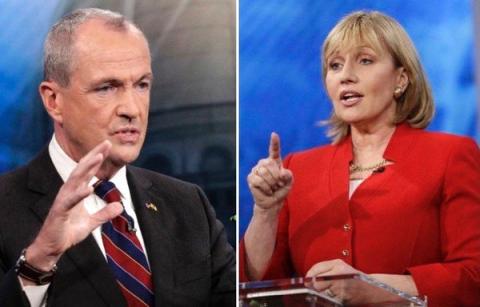The New Jersey primaries produced gubernatorial candidates that are speaking only to two ideological extremes. Politico reported Tuesday that in the 2017 governor's race in New Jersey, neither Democrat Phil Murphy nor Republican Lt. Governor Kim Guadagno appear to be reaching out to voters outside their party's base.
"Together, in one of the first statewide races of the Trump era, Democrat Phil Murphy and Republican Lt. Gov. Kim Guadagno are demolishing the conventional wisdom that centrists win in New Jersey. It could be a sign of what’s to come in 2018 as both parties increasingly forsake the middle in favor of energizing and turning out the farther reaches of the party base," Politico reports.
Both candidates were picked in a closed partisan primary system where voters must be registered with one of the two major parties to participate. Turnout for primary elections has been around or under 10 percent, which means it ends up being the most partisan of a party's base that decide who is on the November ballot.
So is anyone really surprised that neither Murphy nor Guadagno are trying to reach out to more voters? The partisan election system gives the most power to members of the Republican and Democratic Parties -- an ever-shrinking minority of the voting population.
It's important to note that Guadagno defended this system against a lawsuit brought by a coalition of 7 individual plaintiffs and a group of nonpartisan organizations, led by the Independent Voter Project. She said that if "a voter who feels disenfranchised because of a regulation that conditions participation in primary elections on party membership ‘should simply join the party.’"
New Jersey voters are forced to choose between joining "Team Red" or "Team Blue" in primary elections, or not participating at all. And when candidates only have to appeal to the most staunch conservatives or staunch liberals in their base, those are the voters they are going to represent. Everyone else gets left out.
